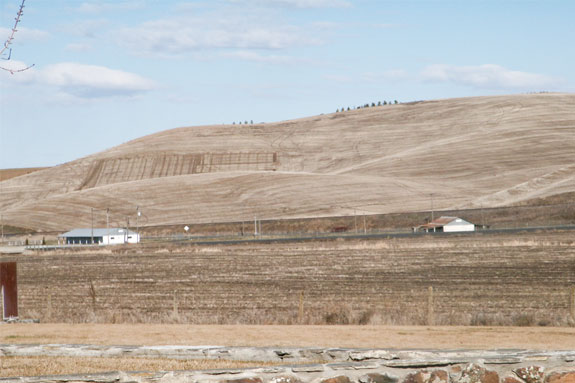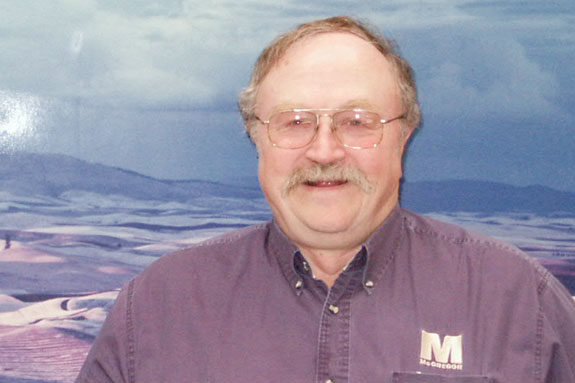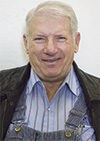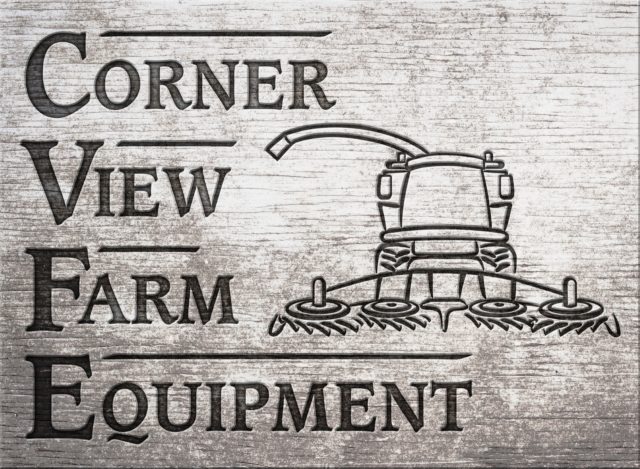Three weeks later the senator in question called Alex and asked him to help him get permission from this grower and others to quote them in testimony before the full Senate of the U.S. on an important matter pertaining to that year’s farm legislation.
I discovered Alex McGregor at the 2010 Washington State Hay Growers Association conference. He was the last speaker in the afternoon of the last day.
After the usual gushy introduction, he got behind the mike and bellowed out a hearty “Good afternoon” of a volume that cleared the bats and pigeons out of the attic, also from the buildings next door.
This was a shock to my system since the previous speaker had many of us nodding off. He maintained that volume through his whole presentation.
“I noticed many dozing and some starting to sneak out, so once I had their attention I determined to keep everyone awake.” That he did.
After a very understandable forecast of the fertilizer and farm chemical markets, he changed subjects on us. He outlined a number of issues that are currently pending that will affect agriculture for generations.
He came with enough copies of a handful of issues so everyone interested could get a copy. He briefly covered each, and then mentioned both vocally and in writing whom to contact on each issue.
“Farm families have a good reputation with the legislatures, but they don’t know much about us,” was Alex’s oft-repeated comment. A candid positive message from a real person on a real farm will do much more to positively affect legislation pertaining to agriculture than tomes of “facts” from the lobbyists.
He went on that legislators are sick and tired of the canned drivel they get from people paid to sway them for special-interest groups, that one or two short notes or e-mails from someone on the farm telling them how the pending measure will affect them will bear much more weight.
Alex is very involved himself. He mentioned that in one 12-month period he was in Washington, D.C. nine times to testify for or against pending legislation affecting agriculture. “I do this because it is one of the things I can do to help our growers make more money for the long haul.”
With the spike in fertilizer prices that followed the oil bubble, Alex mentioned trying to talk sense into the CEOs of the big companies that make and market fertilizer and other agricultural chemicals.
The uniform response to his arguments that “the long haul” for agriculture was more important than “all the market will bear” today was this: “All the stockholders are interested in are the quarterly profits.”

I drove over to meet with Alex. He gave me directions to the McGregor company office. I drove right past the building, thinking, “That’s really a nice new school for this far out in the country.” I was partly right. Included inside the building is an 80-seat theatre-style classroom with computer terminals for each seat.
“This gets a lot of use,” Alex explained. “We use it for training and safety meetings for our people. For grower meetings, we have agronomists from the colleges come in and show off the latest things they have found, etc. It’s also available for use by other ag groups. In fact we encourage its use.”
The McGregor Company employs over 350 individuals, a great many whom have been with the company for 20 or 30 years or more. They are a fertilizer and agricultural supply company with about 44 stores spread over the Inland Northwest, from Grangeville, Idaho, to Pendleton, Oregon, and to Quincy and Eltopia, Washington, with headquarters claiming Colfax, Washington.
The first agronomist the McGregor Company hired had started studies on the use of fertilizer on dryland farms. The all-wise government cut off the funding because “Common knowledge tells you that moisture is the limiting factor for production on dryland farming.”
Those studies, now moved under the McGregor roof, documented that for every one dollar spent for fertilizer properly applied will result in three to four dollars worth of increased crop production.
Alex chuckled as he related some of the history of learning to apply fertilizer. “The good old Ezee Flo style of dry fertilizer spreader was so inconsistent in application that at least you could see from the skips and doubles that the fertilizer was doing some good.” Things improved with anhydrous ammonia coming on board as a nitrogen source. There was a learning curve to apply it.
“We at McGregor pioneered the coil spring-shank anhydrous applicator. It was designed to work in heavy straw. We were ridiculed at all the ag shows for the first few years and now the coil spring-shank applicator is the industry standard.”
The McGregor Company currently has about a thousand test plots scattered all over the region. Alex showed me a group on a hillside visible from the office building. “In most areas of the Inland Northwest, it’s common to cross the road and have a completely different soil type.
That’s why we have test plots and a whole group of agronomists on board now. What we sell our growers has to make money for them. We do a lot of things to help our growers make money for the long haul.”
This all began when his grand-father and his grandfather’s three brothers walked all over the Inland Northwest and settled at Hooper, Washington. It was the only way they could explore the region to know for sure they settled in the right place.
Tending sheep was a sure way to get a start in those days, and it worked for the McGregor brothers. The standard wage for the herder was one-third of the lamb crop for caring for the band for a year.
They chose Hooper because it appeared to be a place with mild weather where they could winter their sheep. The McGregor Company still owns the original farmstead which is kept in good repair, as well as the boarding house, or “Hooper Hotel,” as it was called. Current and retired McGregor employees still live there.
Alexander Campbell McGregor doesn’t advertise it, but he earned a doctor of philosophy degree and taught history for about four years way back when. In that time-frame he wrote a book, “Counting Sheep” (University of Washington Press, 1982) that is a treasure of the history of the Columbia Plateau region.
Speaking of his degree, Alex said, “I’m glad to have it but I don’t say much about it. I got it and wrote the book just because I thought the story of the farm families in the region needed to be told.”
The early McGregor brothers explored the region on foot. One of them in a letter that is part of the book, notes that “Sixty miles was the farthest he ever walked without having anything to eat.”
After the era of near “range wars” between the cattle and sheep interests, the concept of leased public rangeland evolved. The McGregors’ first lease was for 23,000 acres of range for $100 the first year and $200 per year after that. A general store in Hooper followed shortly. Alex mentioned that the McGregor Company has been in business now for over 125 years.
The book chronicles the early attempts at irrigation for the region. In 1905 it was proposed that the Palouse River could be harnessed to water the whole Columbia Basin.
“Whoever thought that up must only have seen the Palouse River at flood stage in a very wet year,” was Alex’s comment on that one. Many crops were tried in the dryland region, from apples to alfalfa. The only viable alternative to wheat was barley, but it produced about the same yield and was worth much less than wheat.
I asked Alex how involved his company is in hay and forage production. He said that the only hay they actually grow is for their own animals at the Hooper farm. Then he went on to say that in the Eltopia and Quincy (Washington) areas, they have four or five full-time fieldmen who do nothing but work with hay growers. “We are widely diversified.”
We in agriculture have a history to be proud of. In one generation there has been a 250 percent increase in production and an 85 percent reduction in soil erosion. Currently 2 percent of the population is actively “on the farm.” The future is bright. Every three seconds there are eight more mouths to feed. In a similar time-frame, 1.5 acres of farmland are lost.
Of concern is that the average farmer is 57 years old. One of the things his father passed on to Alex from his grandfather is the understanding that in agriculture, trust and relationships are built over a long time. Technology is changing. He remembers his father adamantly stating that “No computer will ever pass through the doors of this office!”
A short time later his sons prevailed on him to take another look. He had a year-long study done, which, of course, found that they were behind the times without computers. To his son who was pushing the hardest for computers, he said, “I knew what the answer would be. The year-long study just kept you off my back about it for a little while.” As far as technology goes, you cannot stand still.
He quoted President Eisenhower as having said, “Farming looks mighty simple when your plow is a pencil and you’re 1,000 miles from the field.” Most of the country sees farm families as good people. But they do not understand us. On this note, Alex gets excited. It makes a big impact when growers send letters and e-mails to those who sit in the legislature. WE ARE HEARD.
As growers we need to take on any issues that will help us or hurt us. We need to speak with one voice as “Agriculture.” We need to build relationships with legislators on both sides of the aisle.
“It’s getting to be more urban-versus-rural than “R” versus “D.” We may not win all the battles but at least we can educate people to understand the issue. Speak out. Be “Team Agriculture.”
I asked Alex what he saw changing for the hay and forage industry in the near future. He said that Roundup Ready alfalfa, no matter which way the debate was settled, would be a major impact.
He noted that the export hay industry had evolved from a curiosity to a major cornerstone of the industry. Alex thought that the Pacific Rim countries could very well lead us out of the recession. “As the economies of those emerging countries improve, the diet will change from mainly rice to some added animal protein. That means more need for hay in those countries.”
On the topic of the recession, I asked him how they were doing keeping all their employees employed.
“We are actively recruiting,” was his instant reply. They have one lady in one office who works full-time at recruiting. “We want people who are looking for a career. We work with FFA and we have our own college scholarship program.”
As an industry we need to get more youth into agriculture. That includes working for the government. A kid with an honest farm background will do the whole country so much more good in the ag agencies than a city boy who thinks a wolf is a big, fuzzy puppy. Wildlife habitat does so much better when it is managed by farmers and ranchers.
Agriculture has a very positive story to tell. We need to spend patient time informing people what we do. We have a very candid, positive message to share. Pessimism becomes a self-fulfilling prophecy. With only 2 percent of us left on the farm, we must speak up to the urbanites who on average are three generations off of the farm. By the way, Old Glory was proudly waving from a tall flagpole at the McGregor home office. FG
PHOTOS
PHOTO 1: Alex McGregor believes we need to speak with one voice as “Agriculture.”
PHOTO 2: The McGregor Company currently has about a thousand test plots, like the one pictured below, scattered all over the region. Photos courtesy of Brad Nelson.











